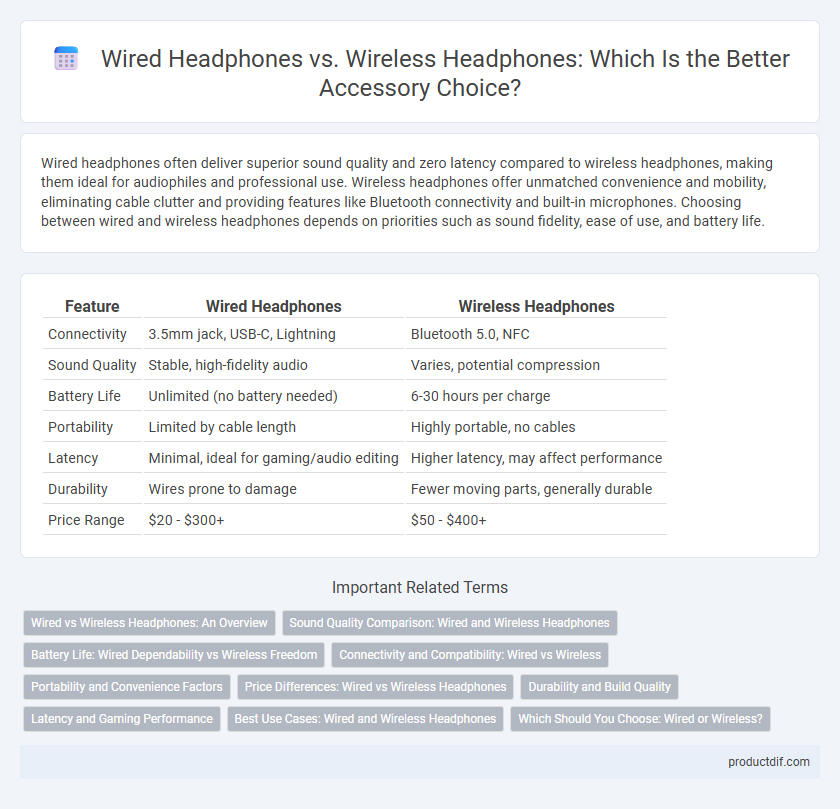Wired headphones often deliver superior sound quality and zero latency compared to wireless headphones, making them ideal for audiophiles and professional use. Wireless headphones offer unmatched convenience and mobility, eliminating cable clutter and providing features like Bluetooth connectivity and built-in microphones. Choosing between wired and wireless headphones depends on priorities such as sound fidelity, ease of use, and battery life.
Table of Comparison
| Feature | Wired Headphones | Wireless Headphones |
|---|---|---|
| Connectivity | 3.5mm jack, USB-C, Lightning | Bluetooth 5.0, NFC |
| Sound Quality | Stable, high-fidelity audio | Varies, potential compression |
| Battery Life | Unlimited (no battery needed) | 6-30 hours per charge |
| Portability | Limited by cable length | Highly portable, no cables |
| Latency | Minimal, ideal for gaming/audio editing | Higher latency, may affect performance |
| Durability | Wires prone to damage | Fewer moving parts, generally durable |
| Price Range | $20 - $300+ | $50 - $400+ |
Wired vs Wireless Headphones: An Overview
Wired headphones provide consistent audio quality and zero latency due to their direct connection, making them ideal for professional audio and gaming applications. Wireless headphones offer greater mobility and convenience with Bluetooth technology, supporting long-range connectivity and hands-free use, though they may experience occasional interference or battery limitations. Choosing between wired and wireless headphones depends on priorities like sound fidelity, portability, and usage scenarios.
Sound Quality Comparison: Wired and Wireless Headphones
Wired headphones typically deliver superior sound quality due to direct audio signal transmission that reduces latency and interference, providing clearer and more accurate audio reproduction. Wireless headphones rely on Bluetooth codecs such as aptX, AAC, or LDAC to compress and transmit audio, which can introduce slight compression artifacts affecting sound fidelity. Audiophiles often prefer wired options for critical listening because of their consistent sound performance and wider frequency response range.
Battery Life: Wired Dependability vs Wireless Freedom
Wired headphones offer unmatched dependability with no battery concerns, providing continuous audio playback as long as they remain plugged in. Wireless headphones rely on battery power, with models offering between 8 to 30 hours of playback on a single charge, demanding periodic recharging to maintain freedom from cords. Advances in battery technology have extended wireless headphone use, but wired options remain the best choice for uninterrupted listening.
Connectivity and Compatibility: Wired vs Wireless
Wired headphones offer stable, low-latency connectivity with universal compatibility across devices featuring standard audio jacks, ensuring consistent audio quality without battery dependency. Wireless headphones rely on Bluetooth technology, providing greater mobility and convenience but may encounter latency issues and require device pairing, with compatibility varying depending on Bluetooth versions and codecs supported. Choosing between wired and wireless depends on device compatibility, usage scenarios, and desired connectivity stability.
Portability and Convenience Factors
Wireless headphones offer superior portability by eliminating tangled cords and enabling freedom of movement, making them ideal for on-the-go use. Wired headphones require a physical connection to devices, which can limit mobility and convenience, especially during activities like workouts or commuting. Battery life in wireless models is a crucial convenience factor, as it determines uninterrupted usage compared to wired counterparts that do not rely on power sources.
Price Differences: Wired vs Wireless Headphones
Wired headphones generally offer a more affordable price point compared to wireless headphones due to simpler design and lack of Bluetooth technology. Wireless headphones often carry a premium cost because of integrated features like rechargeable batteries, Bluetooth connectivity, and advanced noise-cancelling technology. Consumers seeking budget-friendly options typically prefer wired models, while those valuing convenience and freedom from cables tend to invest in wireless alternatives despite the higher price.
Durability and Build Quality
Wired headphones generally offer superior durability and build quality due to fewer electronic components vulnerable to damage, resulting in longer lifespan under heavy use. Their robust construction often includes reinforced cables and metal or hard plastics, minimizing wear and tear compared to wireless models. Wireless headphones incorporate delicate batteries and wireless chips that may degrade over time, reducing overall durability despite modern advancements in materials.
Latency and Gaming Performance
Wired headphones provide near-zero latency crucial for competitive gaming, ensuring instant audio feedback for precise actions. Wireless headphones typically exhibit higher latency due to Bluetooth transmission, which can result in audio delays that disrupt gaming performance. Gamers seeking optimal responsiveness often prefer wired options to maintain synchronous sound and gameplay.
Best Use Cases: Wired and Wireless Headphones
Wired headphones excel in scenarios demanding high-fidelity audio and zero latency, making them ideal for professional studio monitoring and gaming. Wireless headphones offer superior convenience for workouts, commuting, and casual listening with freedom of movement and modern features like Bluetooth connectivity and noise cancellation. Selecting between wired or wireless depends on balancing sound quality, mobility, and usage environment.
Which Should You Choose: Wired or Wireless?
Wired headphones offer superior sound quality and zero latency, making them ideal for audiophiles and professional use, while wireless headphones provide greater convenience and mobility through Bluetooth connectivity. Battery life is a crucial factor for wireless models, often requiring regular charging, whereas wired headphones rely solely on device power. Choosing between wired and wireless depends on your priorities for sound fidelity versus freedom of movement and device compatibility.
Wired headphones vs wireless headphones Infographic

 productdif.com
productdif.com